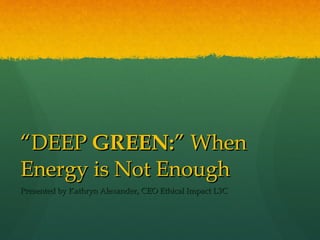Deep Green: When Energy Savings Aren't Enough
- 1. ŌĆ£ DEEP GREEN: ŌĆØ When Energy is Not Enough Presented by Kathryn Alexander, CEO Ethical Impact L3C
- 2. A Short Primer on: Benefits Processes Challenges Of moving to sustainability
- 3. The Market Place Becoming a market leader Consumers are asking for more responsible products Seeking authenticity ŌĆō transparency SEC fining for greenwashing New regulations and compliance requirements Thou shalt not How you prove it
- 4. The Market Place Product/Service pricing Reduce costs ŌĆō duh Energy consumption Electricity Transportation Carbon Waste Use Less Packaging Water use Pollution Chemicals CO2 Light
- 5. Is There Enough? The Situation What are we running out of? Dirt, land, oil, coal, natural gas, helium, water, gold, phosphorus, rare Earth minerals, transition metals/copper, lithium, lead, zinc, fish If we still have 40-100 years of these are we still ŌĆśrunning out?ŌĆÖ WhatŌĆÖs increasing? Population Consumerism
- 6. The Changing Climate Warm for last 10,000 years ŌĆō this is the period in which we have flourished and become ŌĆścivilized.ŌĆÖ What warming does to our current way of life: Weather changes Plants, animals and insects shift; cities, trees and some large animals cannot Impact on agriculture Rising sea levels WhatŌĆÖs changed in YOUR life time?
- 7. Why an Energy Focus is Not Enough Energy use reduction buys time Alternatives offer options, but are not sustainable yet Pollution in mfg Use of rare earths and other scarce resources Waste reduction, recycle, reuse ŌĆō buys time Needs to go back into resource stream ZERO waste = eatable, local, cascades of use
- 8. Why an Energy Focus is Not Enough Water reuse and recycle Aquifers take millennia to fill Methane drilling Planet warming = drying Natural gas Fracting and the water supply Ocean changes Over fishing Melting ice = less salinity Higher sea levels = displaced populations
- 9. Why an Energy Focus is Not Enough Agriculture GMO Fertilizers, bugs and weeds Soil death and depletion Changing weather patterns Transportation/globalization Depleted National self-sufficiency Carbon Forestry Agriculture
- 10. WhatŌĆÖs Under Our Control? Resource use Pollution Waste* Land use and soil fertility Our culture ŌĆō belief systems Our actions WeŌĆÖve been on the Planet for 5 million years ŌĆō will we be here for another 10,000?
- 11. Sustainable Intelligence Systems Thinking to see interconnections Not analysis See Wholes Redesign all of our systems Ecological Thinking to learn from EarthŌĆÖs wisdom Understanding of Natural Laws Local, cascades, ecologies, no ŌĆśawayŌĆÖ, etc. Rethink and rearticulate our values Three major contexts for decision-making Protection (fear) Effectiveness (winning) Sustainable (win/win/win) Applied Morality and ethics
- 12. Sustainable Intelligence Cognitive abilities Ideas, understanding Emotional Intelligence ŌĆō Daniel Goldman a self-perceived ability, to identify, assess, and manage the emotions of one's self, of others, and of groups Spiritual Intelligence a suite or set of propensities comprising: perceptions, intuitions, cognitions, etc., related to spirituality and/or religiosity, especially spiritual capital Spiritual capital is the quantification of the value to individuals, groups and society of spiritual, moral or psychological beliefs and practices Deep Change ŌĆō Cindy Wigglesworth ŌĆ£ Lead yourself first with such authenticity and depth that other people will choose to followŌĆØ ┬Ā ŌĆō Cindy Wigglesworth, Founder of Deep Change Sustainable Intelligence All of the above with the addition of systems thinking and natureŌĆÖs wisdom
- 13. What YOU can do Now Learn Systems Thinking Systems thinking is a framework that is based on the belief that the component parts of a system can best be understood in the context of relationships with each other and with other systems, rather than in isolation. The only way to fully understand why a problem or element occurs and persists is to understand the part in relation to the whole. (Capra, 1997) Regis University, Colorado State, Ethical Impact L3C and others
- 14. What YOU can do Now Ecological Thinking We live on a planet with finite resources, with only one input from the outside -- the energy from the sun. While our technologies can rearrange matter to better suit our convenience, and extract energy by reaching farther and farther into the depths of the Earth, the limits to this process have become evident. A return to "ecological thinking" is necessary if we are to survive. Our deep involvement and preoccupation with technological thinking to the exclusion of ecological thinking has been a major contributor to environmental degradation. Carnegie Mellon website ZERI, Colorado State, Ethical Impact L3C and others
- 15. What YOU can do Now From the Carnegie Mellon website http://telstar.ote.cmu.edu/environ/m3/s5/index.shtml Technological Thinking vs. Ecological Thinking (adapted from FRITJOF CAPRA) Technological Thinking Ecological Thinking PARTS PATTERNS Focus on parts and how they connect for immediate performance Focus on patterns, context, connectedness, and relationships ANALYSIS CONTEXT Problems reduced or taken apart for understanding Whole = sum of parts ┬Ā Need understanding of parts in context of larger whole Whole > sum of parts OBJECTS RELATIONSHIPS World as collection of objects; relationships secondary. ┬Ā Objects are networks of relationships HIERARCHIES NETWORKS/ECOLOGIES Gives sense of rigid structures of domination and control Multileveled order of interdependence STRUCTURE PROCESS Product- oriented thinking, often in terms of closed systems Contextual thinking or weaving together to make sure there is free flow in network; structure follows. Often open systems.
- 16. What YOU can do Now Sustainable Intelligence The "old ways" of leadership development are no longer working. To guide meaningful, transformative, lasting change that truly matters... you need to build deep intelligence. ~ Cindy Wigglesworth Ethical Impact L3C, Bioneers, Biomimicry Institute January 10 = Business Case for Sustainability January 18 ŌĆō Introduction to Values-Based decision-Making January 19 ŌĆō Strategic Planning for Small Business January 26 ŌĆō Systems Thinking for Business Leaders Check out our Quick Values Quiz!
- 17. Contact Us Ethical Impact L3C (303) 440-5833 (888) 331-7492 [email_address] http://www.ethicalimpact.com

















![Contact Us Ethical Impact L3C (303) 440-5833 (888) 331-7492 [email_address] http://www.ethicalimpact.com](https://image.slidesharecdn.com/deepgreen-110108095858-phpapp01/85/Deep-Green-When-Energy-Savings-Aren-t-Enough-17-320.jpg)